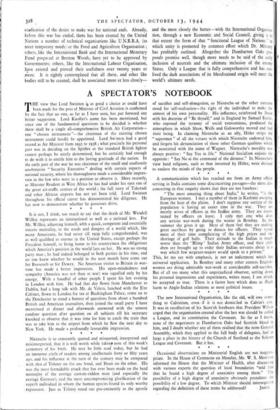Nietzsche is so constantly quoted and misquoted, interpreted and misinterpreted,
that it is well worth while takinm note of this week's centenary of his birth. He may be little read today, but he had an immense circle of readers among intellectuals forty or fifty years ago. and his influence at the turn of the century may be compared with that of Tolstoy on the one hand, and Ibsen on the other. His was the most formidable attack that has ever been made on the herd mentality of the average custom-ridden man (and especially the average German); and the most uncompromising glorification of the superb individual in whom the human species found its only worthy • expression. Just as Tolstoy stood out pre-eminently as the apostle
of sacrifice and self-abnegation, so Nietzsche eat the other extreme stood for self-realisation—the right of the individual to make the utmost of his own personality. His influence, reinforced by Ibsen with his doctrine of " Be thyself," and in England by Samuel Butler, who exposed the tyranny of social conventions, produced the atmosphere in which Shaw, Wells and Galsworthy moved and had their being. In claiming Nietzsche as an ally, Hitler strips the " superman" of all the virtues with which Nietzsche endowed him, and forgets his denunciation of those other German qualities which he associated with the name of Wagner. Nietzsche's morality was always positive: " Say Yea to life." National Socialism enjoins the opposite: " Say No at the command of the dictator." In Nietzsche's view herd religions, such as that invented by Hitler, were devised to enslave the minds of the people.
* * * *


























 Previous page
Previous page